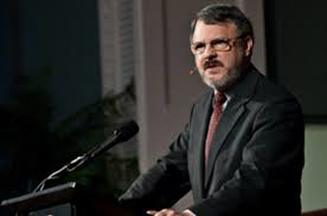|
On Thursday of this week, many in America will take time to celebrate Thanksgiving. While the "fixin's" of Thanksgiving (family/fellowship, food, and football) are good and to be enjoyed, the "main dish" is always gratitude - acknowledging the blessings we've been given and for which we should express thanks.
And it's important to remember the ultimate Giver is God, the one to whom, ultimately, we should direct our thanks. In this sense, Thanksgiving is an opportunity to practice theology as we remember who God is and the things God has done for which we are thankful, and as we express our gratitude to God. (Check out Psalm 136:1-26; 1 Thessalonians 5:18; James 1:17) To help us reflect on how Thanksgiving and theology can go together (like mashed potatoes and gravy!), I've included a few brief quotes from David Pao's book, Thanksgiving: An Investigation of a Pauline Theme. The following quotes are all from his first chapter, importantly titled "Thanksgiving as God-centeredness."
0 Comments
Theology is important. And we all do it (whether we know it or not). If you're familiar with this site, you'll know I'm an advocate for theology - I want to help others know THAT theology matters, HOW it's important, and WHERE it should lead.
And even while I agree with all of this (and will continue to advocate for these things), I know that certain dangers accompany theology. Besides outright heresy, there is the danger of theological abstraction - where what we say is disconnected from what matters. There is the danger of theological over-exaggeration, where we make something that's a debatable issue into a MAJOR deal and turn it into the litmus test for orthodoxy. There's the danger of "theological bullying." Here the problem isn't so much with our content but with our tone and approach. Instead what we need is a strong concern for theology that is evidently connected to a robust Christian life - loving God with our heart, soul, strength, and mind, and loving others as ourselves. We need a strong concern for theology that is properly-ordered - where the main things are what we talk about most, and minor things become opportunities for sharpening our biblical and theological acumen and not opportunities for unnecessary division and quarreling. We need an approach to theology that cares about both truth and tone. "Doing theology" requires not just a mind full of right stuff, but also "great patience and careful instruction" (cf. 2 Tim 4:2). So should we keep "doing theology" for the glory of God and the health of the church? YES. As we do theology in this way, let's proceed with an eye on transformation, a sense of proportion, and a shepherd's heart. Last week I posted on the idea of "extending ministry through book recommendations." In that post I highlighted three reasons WHY recommending books can extend (NOT replace!) the way Christian leaders serve others. Today, let me dig a little more deeply into HOW I try to apply this practice in my ministry.
In other words, if we believe that recommending books is valuable (per the last post), how do we recommend books well? I see the "ministry" of pointing people towards good books as an important extension of my role as a Christian pastor and teacher. (While I'm talking about the "ministry" of book recommendations in this post, there's lots of overlap here with any sort of learning - worthwhile podcasts and speakers, best blog sites, etc.) One REALLY important thing to note in that first sentence is the word "extension." Book recommendations can extend ministry, but they never REPLACE ministry or become the sum total of ministry. So don't misunderstand me to mean that we can throw bibliographies at people and then back away. That's note the case.
Nevertheless, I maintain that book recommendations can extend ministry in important ways. In this post I'll talk about WHY book recommendations are important, and in a future post I'll get practical and talk about HOW I try and take steps in this direction. Too often I think the value of theology is under-appreciated, and the task of theology is misunderstood. Too many reduce theology to an abstract, esoteric task that doesn't really have anything to do with things that matter most. This is a view of theology that I do everything I can do work against. Instead, as I've tried to show before, we need a better picture for theology and how to do theology well. Theology matters. In line with this re-presentation of theology, I'm grateful for Kevin Vanhoozer and what he says about the PURPOSE of theology. (In case you don't know the name Kevin Vanhoozer, let me suggest he's a contemporary theologian that many of us should be listening to. Check out this article Christianity Today recently did on him.) This quote on the PURPOSE (and value) of theology is from a recent book Vanhoozer co-authors with Owen Strachan, The Pastor as Public Theologian: Reclaiming a Lost Vision, page 125. Listen to this: What are theologians for? ....We reply: for confessing, comprehending, celebrating, communicating, commending, and conforming themselves and others to what is in Christ." This last phrase is shorthand Vanhoozer uses to talk about the reality of what Christ's death and resurrection accomplishes for us and offers to us. Vanhoozer continues: Theology serves the church to the extent that it helps disciples fulfill their vocation to put on Christ and grow into 'the measure of the stature of the fullness of Christ' (Eph. 4:13). The real work of theology is indeed public: growing persons, cultivating a people. It is about helping individuals and communities to grow into the fullness of Christ. In sum: the real work of theology is the work of getting real - conforming people's speech, thoughts, and actions to the mind and heart of Jesus Christ, the source and standard of all truth, goodness, and beauty." God is a communicating God. Throughout Scripture, we discover that God speaks. By the power of His word He speaks creation into existence (Genesis 1:3, 6, 9, 14, 20, 24, 26). He takes the initiative to reveal Himself (Exodus 34:5-7). God calls people to fresh steps of faith and obedience, in line with His mission (Genesis 12:1-3; Acts 13:2). He encourages and offers hope (Acts 18:9-10). God is a communicating God.
Besides saying THAT God speaks, it's also important to note HOW God speaks. He is certainly able to speak directly, as seen in so many of the above Scripture passages. He speaks through human prophets in the Old Testament. These prophets calls God's people back to God's relationship with them, and how they ought to live in light of that. God has given us His Son. In the words of Jesus we hear God speaking to us, showing us how to follow Him and receive life to the fullest – life the way we were designed to live. God has given us His Word, the Bible. In the pages of this true, authoritative, divinely-inspired book we meet the God who speaks. In the pages of this living-and-active book we encounter truth that transforms our minds and equips us for every good work (cf. Romans 12:2; 2 Timothy 3:16-17; Hebrews 4:12). In all of this, we see again and again the God is a communicating God. The question is, are we listening? As we seek to listen well, I find it helpful to keep four things in mind:
Anyone who's asked me about theologians who have influenced me will have heard me say that J.I. Packer is the first "official" theologian to capture my imagination and ignite my mind and heart. I ran across his Knowing God in late high school, loved it, and have been hooked on doing theology in the service of the church ever since.
A few months ago I posted a video where evangelical leaders speak of Packer's influence and legacy, and am happy to see Crossway Publishing produce this brief video (approximately 20 min) helping others get to know J.I. Packer a bit better. May the Lord continue to raise up theological leaders like J.I. Packer! Directly below you'll find the video, and I've provided some time stamps outlining the video directly beneath that. J. I. Packer: In His Own Words from Crossway on Vimeo. |
Tim WiebeChristian. Husband. Father. Pastor. Learner. Contributor. Reader. Categories
All
Archives
June 2024
|
© 2014-2024 | 11607 M Circle, Omaha NE, 68137 | www.thebrooksideinstitute.net







 RSS Feed
RSS Feed
